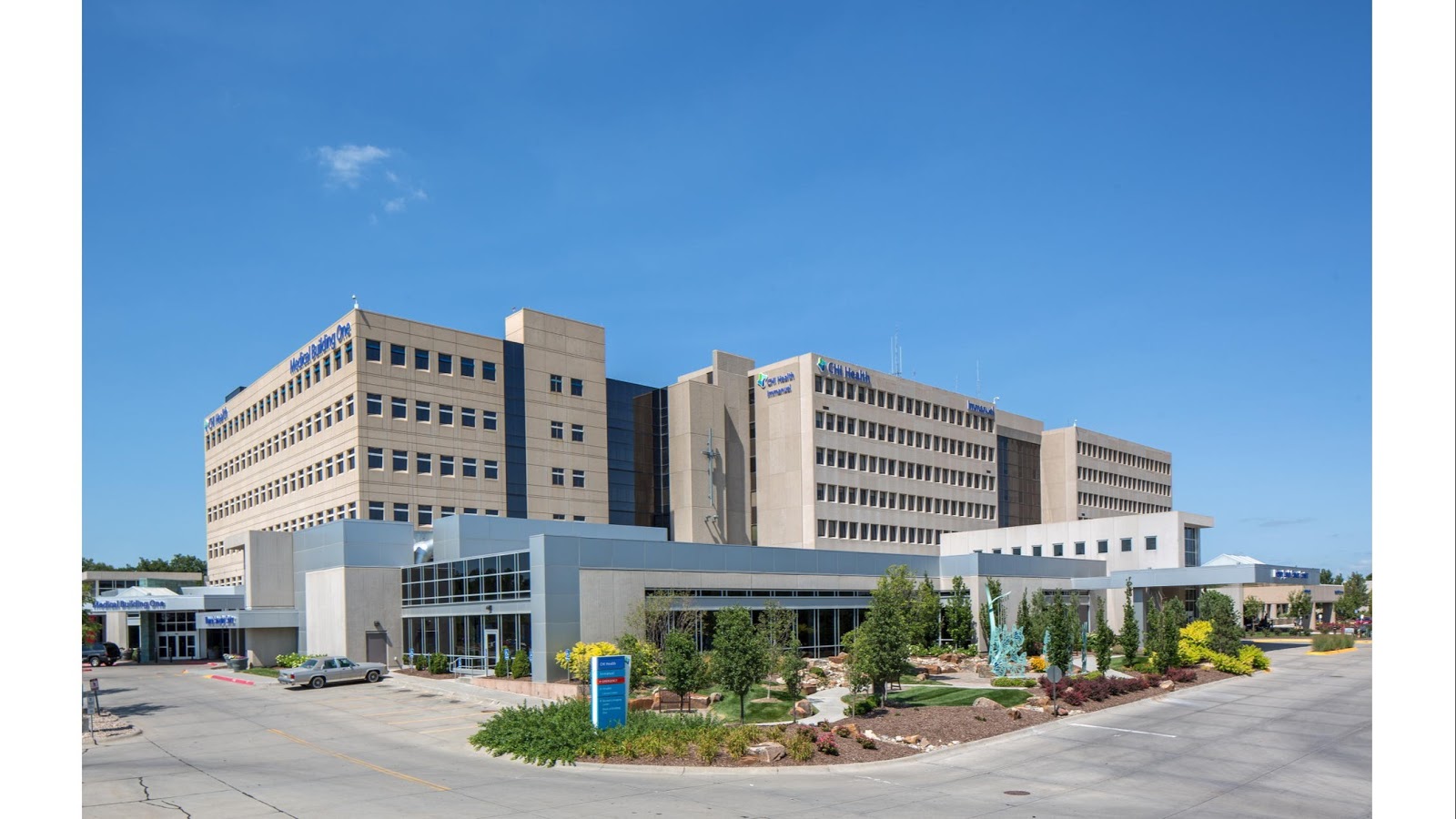Overview
CHI Health Immanuel - Inpatient is a mental health treatment center for people seeking treatment near Douglas County. As part of their treatment modalities for recovery, CHI Health Immanuel - Inpatient provides couples/family therapy during treatment. CHI Health Immanuel - Inpatient is located in Omaha, Nebraska, accepting cash or self-payment for treatment.
CHI Health Immanuel - Inpatient at a Glance
Payment Options
- Cash or self-payment
- Medicaid
- Medicare
- State-financed health insurance plan other than Medicaid
- Private health insurance
Assessments
- Screening for tobacco use
- Comprehensive mental health assessment
Age Groups
- Children/adolescents
- Young adults
- Adults
- Seniors
Ancillary Services
- Assertive community treatment
- Case management service
- Chronic disease/illness management
- Court-ordered outpatient treatment
- Diet and exercise counseling
Treatment At CHI Health Immanuel - Inpatient

Conditions Treated
Mental health treatment:
Mental health facilities offer a safe space for individuals to get specialized care. Trained experts create personal plans using therapies, possibly including medication. The goal is to help individuals cope better and lead fulfilling lives, with constant support and a community feel.

Levels Of Care
Hospital inpatient/24-hour hospital inpatient:
At specific stages of the recovery journey, having round-the-clock support becomes crucial. 24-hour clinical care provides a secure environment for individuals to heal from drug or alcohol addiction, with the assurance that medical detox and other treatments will be administered by professionals at any time.
Partial Hospitalization Program:
Partial Hospitalization Program (PHP) is an intensive, short-term treatment program that provides a structured therapeutic environment for individuals with acute mental health or substance use concerns. Operating during daytime hours, PHP bridges the gap between inpatient hospitalization and traditional outpatient care, allowing participants to return home in the evenings while still receiving a high level of clinical support and therapy during the day. The program typically includes group therapy, individual counseling, medication management, and other therapeutic interventions tailored to the needs of the individual.

Treatment Modalities
Couples/family therapy:
Couples Therapy during rehab is a specialized counseling program designed to support couples who are navigating the challenges of addiction recovery together. This form of therapy provides a safe and structured environment where couples can address the impact of substance abuse on their relationship and work towards healing and growth as a team. By addressing both individual and shared issues, couples in rehab can strengthen their bond and increase their chances of sustained recovery, fostering a healthier and happier future together.
Group counseling:
Group Counseling is a therapeutic approach where individuals come together under the guidance of a trained counselor to share experiences, provide mutual support, and gain insights. It fosters a sense of community, promotes understanding through diverse perspectives, and offers personal growth and problem-solving strategies.
Cognitive behavioral therapy:
Cognitive Behavioral Therapy (CBT) is a therapeutic approach that emphasizes the interconnectedness of thoughts, emotions, and actions. It promotes healthy reactions to thoughts and emotions, steering individuals away from harmful responses such as substance abuse. Proven effective for various addiction recoveries, CBT enhances an individual's self-awareness and self-control. Through CBT, individuals learn to better gauge their emotional well-being, communicate more effectively, and handle stress without resorting to drugs or alcohol.
Dialectical behavior therapy:
Dialectical Behavior Therapy (DBT) is a cognitive-behavioral approach specifically designed to help individuals regulate emotions, enhance interpersonal effectiveness, develop distress tolerance, and increase mindfulness. In addiction treatment, DBT equips individuals with practical skills to manage triggers, cope with stressors, and build a life worth living without resorting to substance use. By addressing both the emotional and behavioral challenges of addiction, DBT fosters personal growth and long-term recovery.
Integrated Mental and Substance Use Disorder treatment:
Integrated Mental and Substance Use Disorder treatment is a comprehensive approach to treating individuals with both mental health and substance use disorders. It aims to address both conditions simultaneously through a coordinated and integrated approach. The goal is to improve overall well-being and reduce the risk of relapse.
Activity therapy:
Activity therapy is a therapeutic approach frequently used to assist individuals in their recovery from physical addictions or emotional challenges. The primary objective of this therapeutic modality is to involve the individual in creative activities that promote positive changes in their thought patterns. This form of therapy can be conducted one-on-one with a therapist or within a group setting. The ultimate aim of Activity Therapy is to alleviate stress and anxiety while fostering increased self-confidence and improved social interaction skills.
Electroconvulsive therapy:
Electroconvulsive Therapy (ECT) is a medical procedure that uses controlled electrical currents to treat severe mental health conditions, like major depression and bipolar disorder. It's often considered when other treatments haven't worked, and it can provide rapid relief. ECT is conducted under anesthesia and muscle relaxants to ensure safety.
Telemedicine/telehealth therapy:
Telehealth provides a secure and handy way to access behavioral health care from your home. It eliminates the need for travel, time off work, or organizing childcare. A range of services, including individual therapy, group sessions, and monitoring for anxiety and depression, are available remotely. Rest assured, telehealth video sessions are not recorded, ensuring your information remains as confidential as in-person consultations.
Ancillary Services
Languages
- Sign language services for the deaf and hard of hearing
Additional Services
- Pharmacotherapies administered during treatment
- Mentoring/peer support
- Metabolic syndrome monitoring
Special Programs
- Persons 18 and older with serious mental illness (SMI)
Contact Information
DISCLAIMER: The facility name, logo and brand are the property and registered trademarks of CHI Health Immanuel - Inpatient, and are being used for identification and informational purposes only. Use of these names, logos and brands shall not imply endorsement. BetterAddictionCare.com is not affiliated with or sponsored by CHI Health Immanuel - Inpatient.


